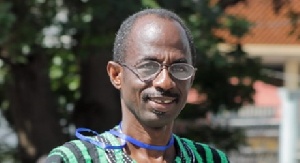- Home - News
- TWI News | TV
- Polls
- Year In Review
- News Archive
- Crime & Punishment
- Politics
- Regional
- Editorial
- Health
- Ghanaians Abroad
- Tabloid
- Africa
- Religion
- Election 2020
- Coronavirus
- News Videos | TV
- Photo Archives
- News Headlines
- Press Release
General News of Thursday, 15 August 2013
Source: Daily Guide
Asiedu Nketia runs away from riches
General Secretary of the ruling National Democratic Congress (NDC), Johnson Asiedu Nketia, has excluded himself from the league of rich men in Ghana today.
This follows speculations that he owns several holdings including an oil tanker, tipper trucks and a number of houses across the country.
The event was at a press conference put together by the General Secretaries of political parties with representation in Parliament including the ruling National Democratic Congress (NDC), the main opposition New Patriotic Party (NPP), the Convention Peoples Party (CPP) and the Peoples National Convention (PNC). Mr Asiedu-Nketiah comments were in response to the findings of a recent survey dubbed ‘Corruption Perception Index’ (CPI) commissioned by the Ghana Integrity Initiative (GII), the local chapter of Transparency International, (TI) which ranked political parties as the second most corrupt institution in the country.
Present were General Secretaries of the NPP, Kwadwo Owusu Afriyie aka Sir John, Ivor Kobina Greenstreet of the CPP and Bernard Mornah of the PNC.
But in an attempt to douse the flame of the raging speculations, the NDC General Secretary said “if we are to go by allegations… and stories, then I will be seen as one of the richest individuals in Ghana.”
“I’ve heard about me owning 100 tipper trucks that are located somewhere in Kasoa where I don’t know; I am alleged to be the owner of some storey buildings in Kumasi and last week I met somebody at a function and he was congratulating me on putting up some market stalls at Madina lorry park or somewhere I don’t know”, he noted.
Aside from that, Mr Asiedu-Nketia said “others have come talking about tankers that I own and operate; whether they are carrying fuel or not, I don’t know…some have come to talk about my houses in Cuba where properties are not bought and so on and so forth.”
“So if you are working in a democracy and we are all interested in nurturing democracy and you hear these stories and then you put them together and form some results and say this is perception of corruption of so so and so, you are damaging the democracy we are operating in and in fact you are helping to frustrate the fight against corruption”, he said with his emotions high up.
In view of this, General Mosquito, as he is affectionately called, said “we are saying that they got it all wrong when they ask questions that seek to let members of the public point at actions of individuals and putting those actions together as corruption for an organisation because they happen to belong to that organisation.”
This, according to him, was because “candidates who are engaged in seeking positions…end up contributing more than the parties as institutions.”
He and his other colleague General Secretaries did not, for instance, see why and how buying motorbikes for executives of their respective parties in the regions and constituencies would be misconstrued as corruption.
While admitting that corruption was a problem that society continued to suffer its consequences, Mr Greenstreet, who read the statement, said “what we refuse to accept is how corruption in the public sphere makes political party institutions corrupt, especially when there is no evidence to show so.”
“We believe that the image of political parties, the vehicles for such an important exercise that affirm our democratic values and form the bedrock of our nation-state cannot be tarnished in the manner that this index, however, inadvertently, sought to do”, he emphasised.
The various party scribes believed the effect of the survey in question was to compromise public confidence in political parties thereby undermining the entire democratic process since it fed into what the CPP General Secretary described as “the dangerously, palpably false and unfortunate perception that politicians are a privileged class, self serving and unaccountable.”
The General Secretaries of the four parties, therefore, failed to see how alleged perceived corruption of what they referred to as a handful of individuals could be misinterpreted in a way to taint the administration of their respective political parties.











